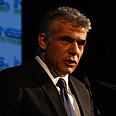
Finance Minister Yair Lapid
Photo: Motti Kimchi
The Arrangements Law, which will be submitted to the Knesset for approval by Finance Minister Yair Lapid,
includes cuts in the funding of unofficial educational institutions which do not teach core curriculum subjects,
the draft law obtained by Ynet reveals.
According to the draft law, which will be submitted to the Knesset ahead of the approval of the state budget, "the condition for recognizing an unofficial institution will be the basic studies which will include 55% of the core curriculum subjects taught in an official educational institutions, in addition to participation in tests examining schools' efficiency and growth measures (known as Meitzav tests) at the same extent and format as an official educational institution."
According to the law, the State will only subsidize ultra-Orthodox institutions which teach at least 55% of the core subjects.
Economic Reforms
Addressing budget plan, finance minister stresses he will promote interests of working class. Justice minister urges resumption of peace talks
The Treasury document explains that the threshold condition for funding is 75% of basic studies… An institution teaching less than that is funded as an exempt institution at a level of 55% and is obligated accordingly to 55% of basic studies. Therefore we suggest that the threshold condition for recognizing an unofficial institution will be core subjects which make up at least 55% of the curriculum."
According to the draft law, the funding will be according to the actual percentage of core studies up to a maximum of 75%.
The draft law also reveals that Shas' educational network, Maayan Hahinuch Hatorani, and the Independent Education System will only be funded if they participate in the Meitzav tests and international exams.
In addition, an inter-ministerial committee will be tasked with looking into ways to raise the matriculation eligibility among the haredi population.
According to the draft law, "The number of students in educational institutions in the haredi sector is expected to reach 26% of all students in Israel by the end of the decade. The employment and productivity rates in the haredi sector are significantly lower than in the general sector, among other things due to the lack of basic studies which serve as a key component in purchasing the suitable tools for entering the labor market. The key core subjects are Hebrew, mathematics and English."















